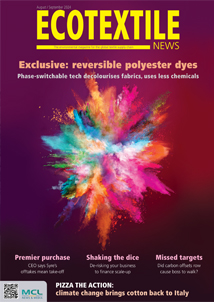WAKEFIELD - In the third of our Ecotextile Talks podcasts supported by Higg, our host Philip Berman talks to Hanna Hallin, global sustainability manager with Treadler, the B2B service launched by the H&M Group last year to help rival companies access its global supply chain.
Hallin explains why H&M decided to let other brands benefit from its expertise, long-term supplier partnerships and strategic sustainability work to help reduce the industry's overall environmental impact.
"It's no secret to anyone that addressing climate (change), finding ways to grow your business in a responsible way is not an option anymore. It's something we all need to do," she said.
"We have to get to this point where industry operates within the planetary boundaries. That's not something that one company can achieve, regardless of how ambitious the goal is... That's something we have to do together and we have to do it fast.
"Treadler really grew from that insight at the H&M Group. To know where and how your products are made is really the first step on that journey because you can't improve what you don't know."
Hallin described Treadler as a "win-win-win-win" which helped progressive suppliers grow their businesses, other brands become more sustainable and H&M achieve its own sustainability targets, while also creating a new revenue stream as a commercial service.
The end-to-end service, from sourcing to logistics, offered access to a traceable, and continually improving, supply chain thanks to data from the Higg Index suite of tools which helped companies manage, measure and share their environmental and social impact data.
Hallin explained how Higg provided Treadler clients with a broad range of data which went beyond that which could be provided by compliance audits which she felt had reached the limits of their usefulness.
Higg data enabled the industry to move towards leading practices by identifying key supply chain challenges so as to draw roadmaps on priorities for sustainable change, she explained.
"It's reliable and robust, and it's third party verified which is important for our clients. To be able to provide that not just on tier 1, but also tier 2, can help you get accurate data on sourcing impact on some of those key KPIs when it comes to climate, environment, water and labour practices," said Hallin.













































